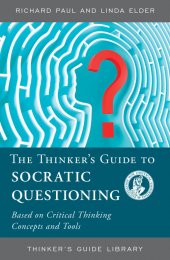Additional Information About:
The Thinker's Guide to Socratic Questioning
Why a Thinker's Guide on the Art of Socratic Questioning?
The unexamined life is not worth living—Socrates
It is hard to imagine someone being a good critical thinker while lacking the disposition to question in a deep way. It is also hard to imagine someone acquiring the disposition to question in a fuller way than Socrates. It follows that those truly interested in critical thinking will also be interested in the art of deep questioning. And learning the Socratic art is a natural place to start.
Socratic questioning is disciplined questioning that can be used to pursue thought in many directions and for many purposes, including: to explore complex ideas, to get to the truth of things, to open up issues and problems, to uncover assumptions, to analyze concepts, to distinguish what we know from what we don’t know, and to follow out logical implications of thought. The key to distinguishing Socratic questioning from questioning per se is that Socratic questioning is systematic, disciplined, and deep, and usually focuses on foundational concepts, principles, theories, issues, or problems.
Teachers, students, or indeed anyone interested in probing thinking at a deep level can and should construct Socratic questions and engage in Socratic dialogue. When we use Socratic questioning in teaching, our purpose may be to probe student thinking, to determine the extent of their knowledge on a given topic, issue or subject, to model Socratic questioning for them, or to help them analyze a concept or line of reasoning. In the final analysis, we want students to learn the discipline of Socratic questioning, so that they begin to use it in reasoning through complex issues, in understanding and assessing the thinking of others, and in following-out the implications of what they, and others think.
In this guide, we focus on the mechanics of Socratic dialogue, on the conceptual tools that critical thinking brings to Socratic dialogue, and on the importance of questioning in cultivating the disciplined mind. Through a critical thinking perspective, we offer a substantive, explicit, and rich understanding of Socratic questioning. We provide analyses of the components of Socratic questioning, along with some contemporary examples of the method applied in elementary through high school classes. To get you started in practicing Socratic questioning, we begin with the nuts and bolts of critical thinking (Part One), followed by some examples of Socratic dialogue (Part Two), and then the mechanics of Socratic dialogue (Part Three). The fourth and fifth sections focus on the importance of questioning in teaching, the contribution of Socrates, and the link between Socratic questioning and critical thinking.
Contents Include:
- A Taxonomy of Socratic Questions Based in Critical Thinking Concepts
- Socratic Questioning Transcripts
- The Mechanics of Socratic Questioning
- The Role of Questions in Teaching, Thinking, and Learning
- Socrates, the Socratic Method, and Critical Thinking
- Patterns in Teaching that Incorporate Socratic Dialogue
- Analyzed Transcript of a Socratic Dialogue from Plato’s Euthyphro
- More On Socrates
